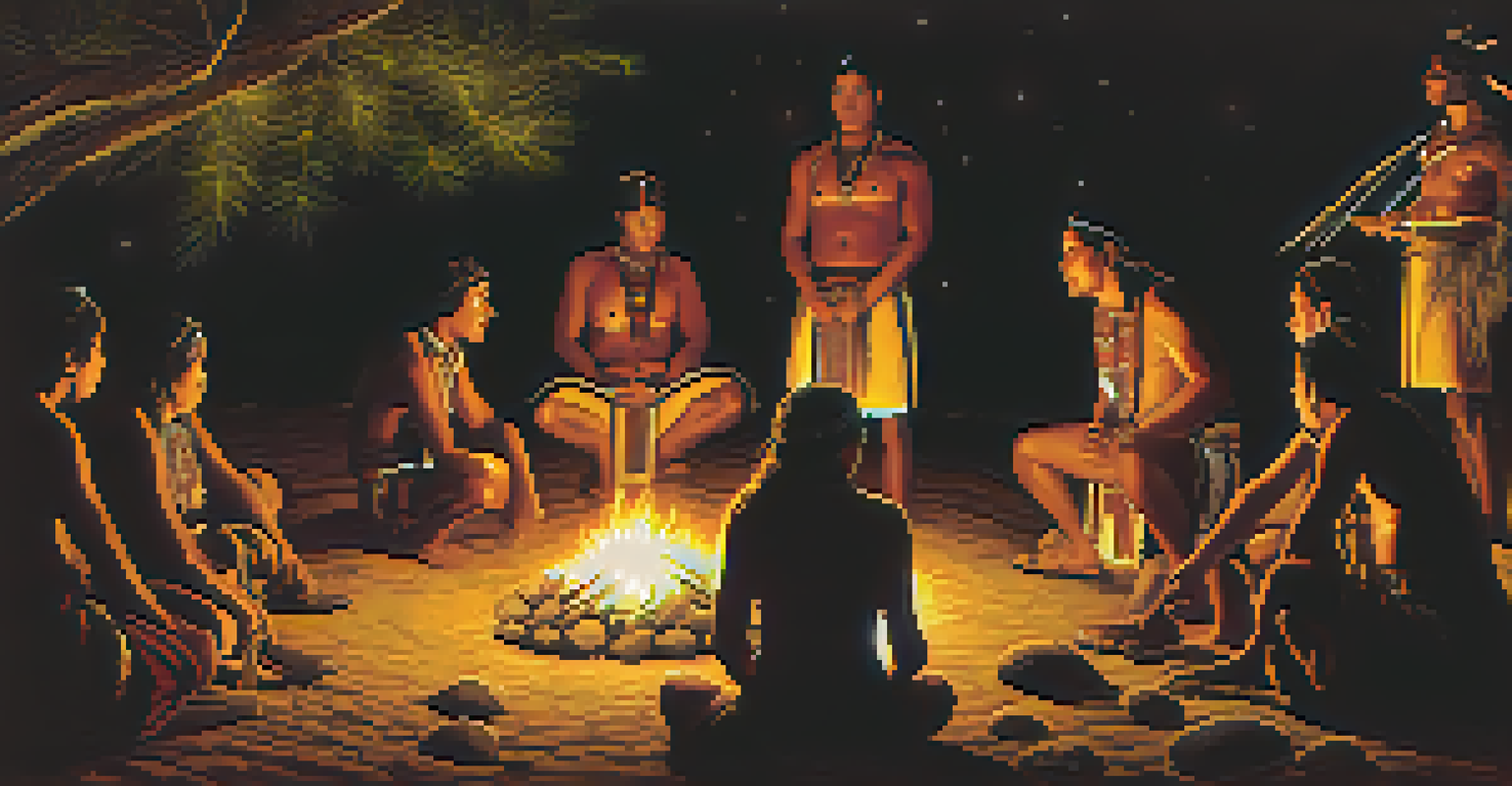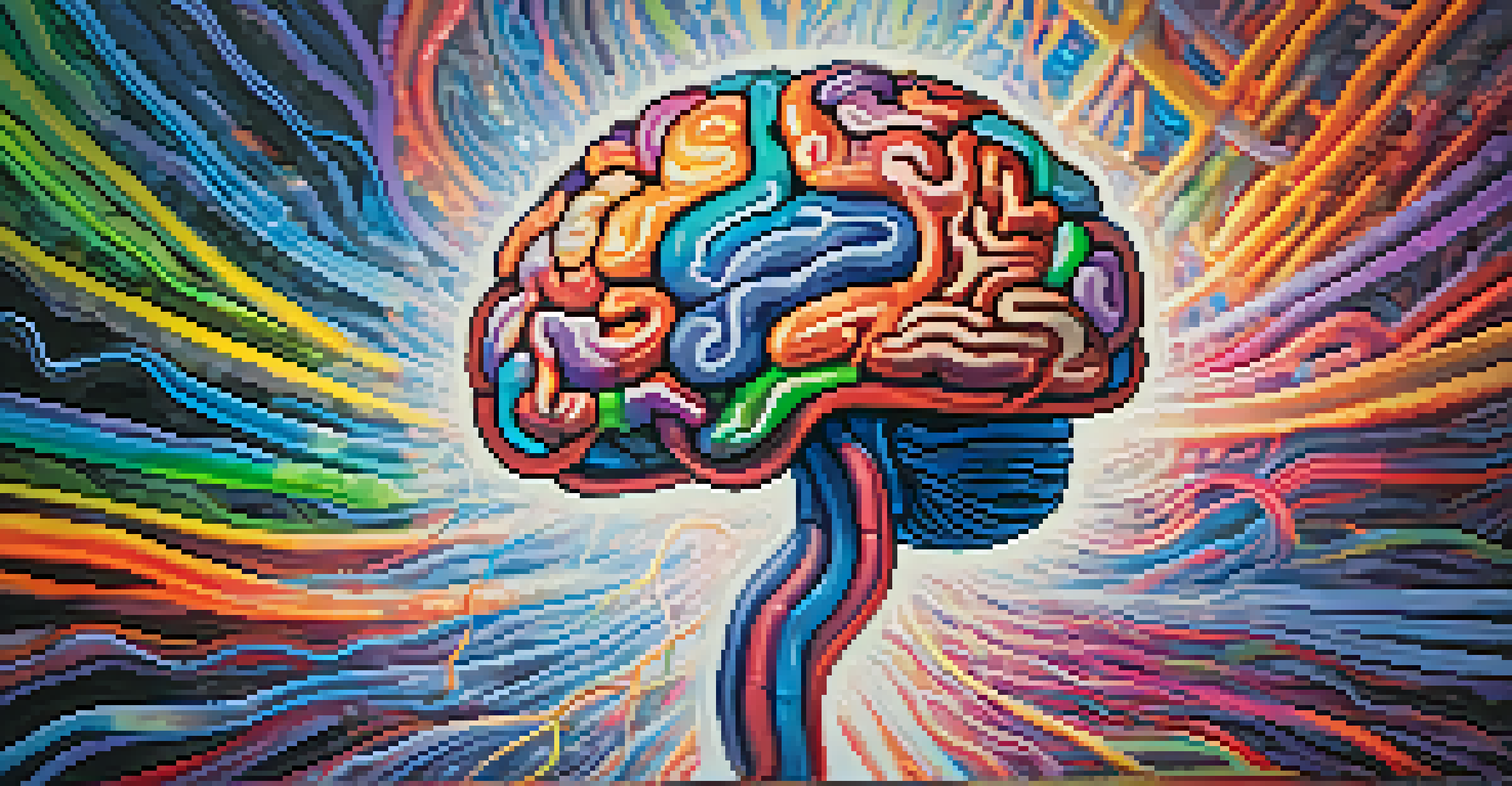Psychedelics and Mental Health: The Peyote Connection

Understanding Peyote: A Brief Overview
Peyote is a small, spineless cactus native to Mexico and the southwestern United States, famous for its psychoactive properties. This cactus contains mescaline, a substance that can induce altered states of consciousness. Traditionally, peyote has been used in Native American spiritual practices for centuries, serving as a means for healing and personal insight.
Psychedelics can help us confront our inner demons and open the door to self-discovery and healing.
The significance of peyote in these cultures cannot be overstated; it plays a crucial role in ceremonies aimed at fostering mental and spiritual well-being. As we explore its connection to mental health, it's essential to acknowledge these ancient practices, which emphasize the importance of community, connection, and personal reflection.
In recent years, there has been a resurgence of interest in psychedelics and their therapeutic potential. Researchers are diving into how substances like peyote might provide insights into treating conditions such as depression, anxiety, and PTSD, paving the way for a new era in mental health treatment.
The Science of Psychedelics and Mental Health
Psychedelics have been shown to affect brain connectivity, leading to new patterns of thought and emotional processing. When individuals experience these altered states, they often report profound insights and shifts in perspective that can help alleviate mental health issues. This phenomenon is particularly evident in studies involving substances like psilocybin and LSD, which share some similarities with peyote's effects.

Research indicates that psychedelics can promote neuroplasticity, the brain's ability to form new connections and pathways. This is particularly beneficial for individuals struggling with mental health disorders, as it can help them break free from negative thought patterns and enhance emotional resilience.
Peyote's Cultural Significance
Peyote has been used in Indigenous cultures for centuries as a spiritual tool for healing and personal growth.
While the exact mechanisms are still being studied, the promise of psychedelics in mental health treatment is gaining traction. As more studies emerge, the understanding of how substances like peyote can facilitate healing becomes clearer, offering hope for those seeking alternative therapies.
Historical Context: Peyote in Indigenous Cultures
The use of peyote dates back thousands of years, with Indigenous peoples utilizing it in religious and healing ceremonies. These practices highlight the plant's role not just as a psychoactive substance but as a tool for personal and communal growth. The ceremonies often involve rituals that encourage introspection, connection to nature, and community bonding.
The mind is like a parachute. It doesn’t work if it isn’t open.
In these traditional contexts, peyote is more than a drug; it serves as a bridge to the spiritual world, offering participants a chance to confront personal challenges and find clarity. This holistic approach can offer valuable lessons for modern mental health practices, emphasizing the importance of cultural and spiritual dimensions in healing.
As society begins to re-evaluate the stigmas surrounding psychedelics, it's crucial to honor and respect the historical context of peyote use. By understanding its cultural significance, we can better appreciate its potential benefits in contemporary mental health treatment.
Potential Benefits of Peyote for Mental Health
Emerging studies suggest that peyote may offer various mental health benefits, including relief from anxiety and depression. Many individuals who have participated in peyote ceremonies report experiencing a sense of connectedness and emotional release, which can be profoundly therapeutic. This aligns with findings indicating that psychedelics can foster emotional breakthroughs and enhanced self-awareness.
Additionally, the introspective nature of peyote experiences may help individuals confront unresolved trauma, leading to significant healing. The process often involves guided support, allowing participants to navigate their experiences safely and effectively.
Psychedelics and Mental Health
Emerging research suggests that peyote and other psychedelics may offer therapeutic benefits for conditions like anxiety and depression.
However, it's essential to approach the use of peyote with caution and respect. While the potential benefits are promising, more rigorous scientific research is needed to fully understand its therapeutic applications and ensure safe usage.
Challenges in Modern Psychedelic Research
Despite the growing interest in psychedelics like peyote, research is often hampered by legal and regulatory challenges. Many psychedelics remain classified as Schedule I substances, meaning they are viewed as having no accepted medical use and a high potential for abuse. This classification complicates the process of conducting scientific studies and limits access to these substances for therapeutic purposes.
Additionally, there is a need for more comprehensive studies that consider the long-term effects of peyote use and its impact on mental health. While preliminary findings are encouraging, understanding the nuances of individual experiences and outcomes is crucial to developing effective treatment protocols.
As the landscape of mental health treatment evolves, advocating for policy changes and supporting research initiatives is essential. Embracing a more open-minded approach to psychedelics could lead to significant advancements in mental health therapies and overall well-being.
The Role of Set and Setting in Peyote Experiences
The concept of 'set and setting' refers to the mindset of the individual and the environment in which a psychedelic experience takes place. These factors can significantly influence the outcomes of a peyote experience, affecting everything from emotional responses to insights gained. Creating a safe, supportive environment is crucial for maximizing the therapeutic potential of peyote.
In traditional Indigenous ceremonies, the setting often includes a community of trusted individuals, rituals, and guidance from experienced shamans or leaders. This structured environment helps participants feel secure, allowing them to explore deeper emotional and spiritual realms without fear or anxiety.
Importance of Set and Setting
The outcomes of peyote experiences are greatly influenced by the individual's mindset and the environment in which the experience occurs.
For those considering peyote for mental health, understanding the importance of set and setting is vital. It emphasizes the need for careful preparation, support, and the right environment to facilitate meaningful and helpful experiences.
Looking Ahead: The Future of Peyote in Mental Health
As interest in psychedelics continues to grow, the future of peyote in mental health treatment looks promising. Researchers are eager to explore its potential benefits more thoroughly, paving the way for innovative therapeutic approaches. With ongoing studies and changing public perceptions, we may soon see peyote integrated into modern mental health practices.
However, this future must be approached with respect for its cultural origins and a commitment to ethical usage. Collaboration with Indigenous communities and practitioners can provide valuable insights into safe and effective practices, ensuring that the wisdom of traditional uses is honored.

Ultimately, the journey of peyote in mental health is just beginning. By fostering a greater understanding of its benefits and challenges, we can open up new avenues for healing and personal growth in our society.